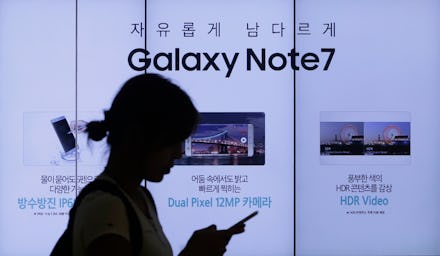Here's why Samsung's batteries exploded, according to Samsung

A report released by Samsung on Sunday night outlines what caused some Galaxy Note 7 batteries to overheat and catch on fire. The South Korean company, which dedicated a team of 700 to test 200,000 phones and 30,000 batteries, says two suppliers are responsible for two separate battery problems.
One malfunction impacted the first batch of Galaxy Note 7 devices released in the fall. According to the report, some handsets overheated because of a design flaw: the battery was too big for the phone's casing. The Galaxy Note 7 featured a 3,500 mAh battery, which makes it the handset with the highest energy density in the entire line of smartphones offered by Samsung, the Chicago Tribune reports.
In response to reports of device's catching on fire, Samsung issued a self-imposed recall of more than 2.5 million Galaxy Note 7s across 10 countries on Sep. 2. At the time, the company described the problem as a "minor flaw in the battery manufacturing process." The voluntary recall was followed by an air travel ban by the Federal Aviation Administration and an official recall by the United States Consumer Product Safety Commission. Customers impacted by the recall were offered replacement devices with batteries built by a different manufacturer.
But many of these smartphones also overheated and caught on fire. This second malfunction, which was unrelated to the problem in the original batch of phones, was caused by a supplier defect, according to Samsung's report. In light of replacement devices overheating, Samsung opted to discontinue the Galaxy Note 7. The entire ordeal is estimated to have cost the company at least $5.3 billion.
While Samsung did not identify which two suppliers are allegedly responsible for the battery mishaps, the Wall Street Journal reports they are Samsung SDI, an affiliated battery subsidiary, and Amperex Technology Ltd., a Hong Kong-based supplier who produced the defective batteries in a factory in China.
The new report from Samsung also outlines what they are doing to prevent a similar situation from occurring again. One measure is to create a team of third-party advisers that includes professors from the University of Cambridge, the University of California at Berkeley and Stanford University. Samsung has also created an eight-point battery check that entails rigorous testing and an X-ray of handsets.
Consumer response to the report appears to be split: Some users are content with Samsung's detailed breakdown while others are not as impressed.